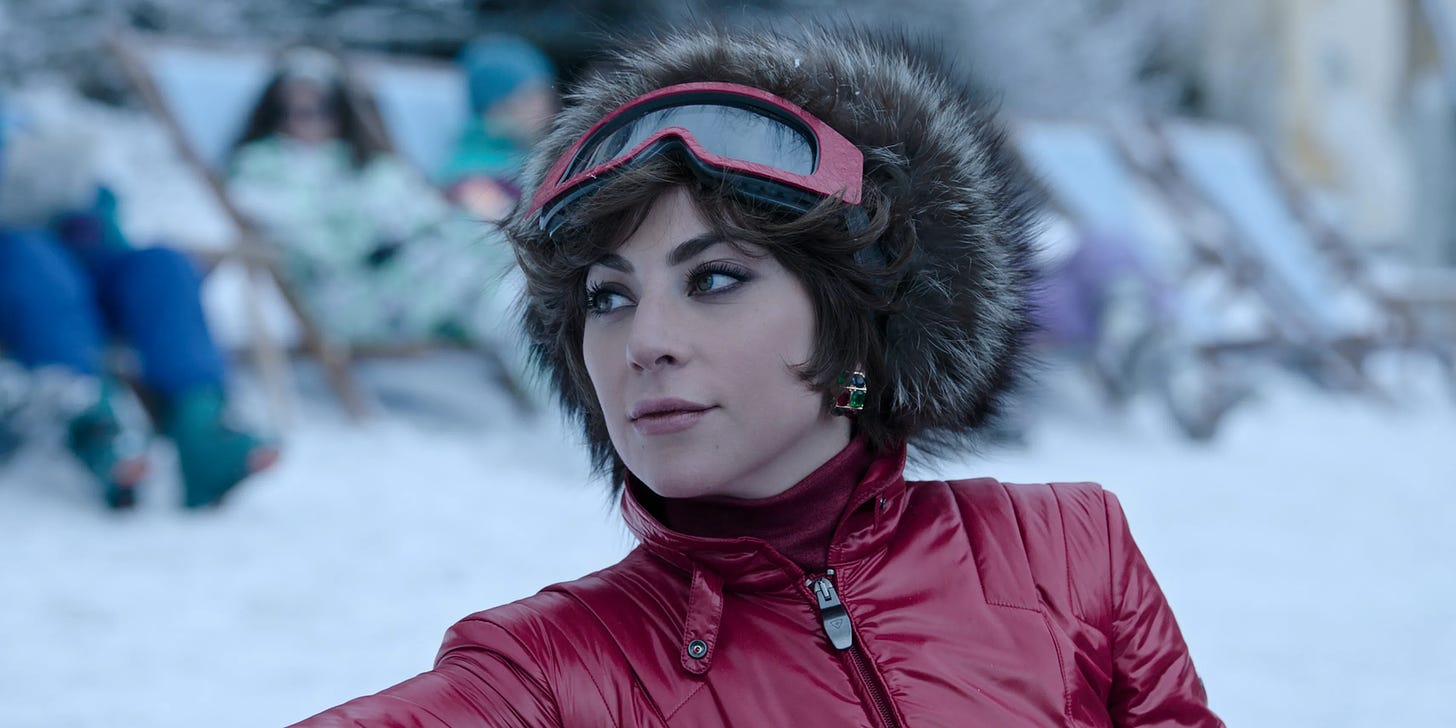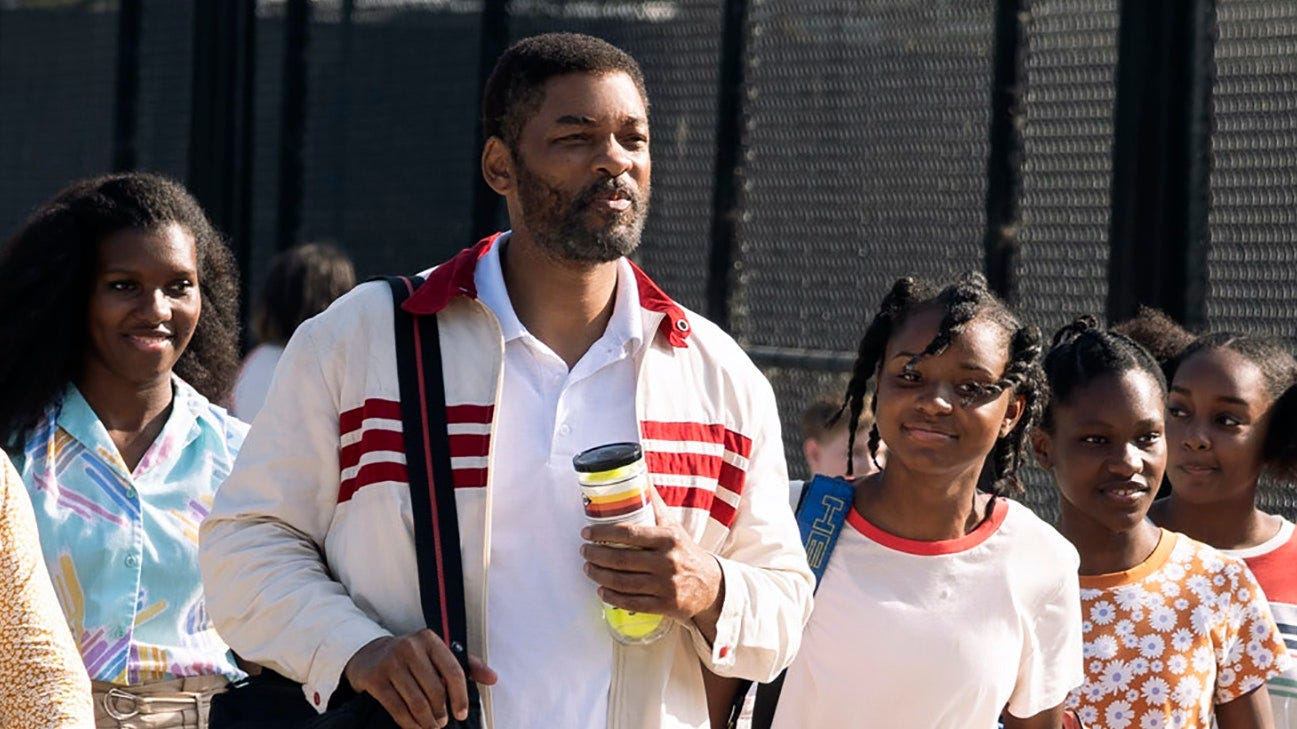In Review: 'House of Gucci,' 'King Richard'
Houses Gucci and Williams get the Hollywood biopic treatment, which means authenticity is as rarefied as a tennis Grand Slam.
House of Gucci
Dir. Ridley Scott
157 min.
There’s no doubt Jared Leto undergoes one of his signature transformations in House of Gucci, playing the businessman and designer Paolo Gucci, an heir to the family’s world-famous fashion brand. The make-up department makes him look like a younger Jeffrey Tambor the morning after a terrible bender, with puffy eyes and cheeks to accompany a mustache and a horseshoe hair pattern turned ragged after passing out on the couch. The costume department has squeezed him into too-tight corduroy suits in pastel colors, which Paolo the designer insists, not persuasively, to be the look of the future. The accent, though, is pure Leto: Each line starting soft and reedy before escalating to the comical robustness of a non-Italian dad saucing up store-bought bucatini on pasta night.
In his defense, there’s an argument to be made that Leto, the most notable thing about this bellicose epic, is hung out to dry here. He seems to be appearing in a campier version of the film that doesn’t exist, despite the best efforts of four of the five lead actors. Lady Gaga, Al Pacino, and Jeremy Irons—to go in descending order of hamminess—are nearly as flamboyant, understanding House of Gucci as the cartoon reflection of the times, about a family that embodied ‘80s materialist excess. But director Ridley Scott, who was so sure-handed in the medieval times of The Last Duel—and so capable of converting its anachronisms and social commentary into laughs—seems firmly in American Gangster mode here, a by-the-numbers biographical approach that fits the film like one of Leto’s pastel suits.
The Reveal is a reader-supported newsletter dedicated to bringing you great essays, reviews and conversation about movies (and a little TV). While both free and paid subscriptions are available, please consider a paid subscription to support our long-term sustainability.
Though House of Gucci has kicked around as a project for the last 15 years—Wong Kar-wai was in line to direct at one point—the time seems right for the tragicomic story of a family business and the Trumpian failsons who are, in different ways, each utterly incapable of running it. Other than scale, there’s not much difference between Paolo’s ambitions as a fashion designer and, say, those of Wyatt Ingraham Koch, son of billionaire Bill Koch and creator of a line of retina-searing shirts. As we’ve seen every week on Succession, where the four adult heirs to a Murdoch-like media empire jockey haplessly for the throne, there’s a folly inherent in a multi-national corporation being treated like the ma-and-pa shop that junior will run some day. Succession turns that into scabrous comedy; House of Gucci turns it into something much vaguer.
There’s a pulp kick to the story of Patrizia Reggiani (Gaga), an outsider who marries into the Gucci family and eventually has her husband, Maurizio Gucci (Adam Driver), killed in a poorly orchestrated hit job. Before that, the confident Patrizia and the self-effacing Maurizio meet cute at a party in Rome and fall in love quickly, much to the horror of Maurizio’s father Rodolfo (Irons), who cuts his son off and refuses to attend the wedding. Uncle Aldo (Pacino) proves to be more welcoming to the happy couple, not least because his own son, Paolo, has revealed himself a colossal disappointment. Though initially reluctant to step up and guide the Gucci brand through the turbulent ‘80s and beyond, Maurizio, with Patrizia’s aggressive encouragement, gets more involved in the company’s operations. All of which is great for Patrizia, who enjoys the power and status of the Gucci name, but becomes less great as her marriage falls apart and her husband’s interests drift elsewhere.
For a stretch in the early-going, House of Gucci seems to mirror The Godfather, with Maurizio as the Michael Corleone type, a low-key and thoughtful private citizen who’s drawn into the family business. But where Michael turns out to be a savagely ruthless gangster at heart, Maurizio’s soft-spoken personality hides the sad fact that the Gucci boys are merely Fredos of a different color. Scott, working from a script by Becky Johnston and Roberto Bentivegna (adapted from Sara Gay Forden’s book), seems only half-keyed-in to the absurdities of his story, which turns, for example, on the relationship between Patrizia and the TV fortune-teller (Salma Hayek) she keeps on retainer. The more garish and Leto-vian the film allows itself to get, the more entertaining it is.
But that’s not where House of Gucci lands, which lays bare Scott’s bad habits for fussing over production details when the writing needs more of his attention. For all the high points in a career that’s 27 films and counting, he’s better at elevating good scripts than salvaging bad ones, and Johnston and Bentivegna’s doesn’t have a strong angle on the Gucci story, other than it being a hell of a yarn. So Scott attaches himself mostly to Driver’s comparatively subdued performance, yawning through the madness that swirls around Maurizio rather than drawing energy from it. He has too much respect for Gucci as a luxury item.
House of Gucci is in theaters everywhere.
King Richard
Dir. Reinaldo Marcus Green
138 min.
There’s a tension between the film King Richard wants to be and the film it actually is, which is perhaps fitting for the contradictory impulses of its hero, Richard Williams, father of all-time tennis greats Venus and Serena Williams. The film it wants to be is a tribute to a boot-strapping sports dad who had a plan for his daughters and executed it, protecting them from the twin threats of their Compton neighborhood and the entrenched culture of the white tennis establishment. The film it actually is casts Richard in a less flattering light than the filmmakers seem to intend, suggesting he’s a bully and a tyrant who doesn’t listen to anyone, especially the women in his life. That’s interesting. Unfortunately, whenever director Reinaldo Marcus Green and his screenwriter, Zach Baylin, try to yank King Richard toward authorized biography territory, it feels inauthentic, sanding the rough edges off a character who doesn’t fit the inspirational mold.
In a welcome structural surprise, King Richard limits its scope to Venus and Serena’s early teens, when Richard (Will Smith) was busy working them through drills on the cracked courts of a Compton park and carefully plotting when (and how and with whom) they might be ready for the next step. It only goes as far as Venus’ first tournament as a professional, when she battled then-#1 seed Arantxa Sánchez-Vicario in the second round of a minor tournament, and leaves all the future Grand Slams and greatest-of-all-time bids for an undepicted future. This allows Green and Baylin to make fatherhood the theme, with the well-supported thesis that Richard’s guidance led the Williams sisters to long-term success while other young stars flamed out.
As Richard, Smith gives a weirdly mannered performance, as if he’s doing an impersonation of a real-life figure while the other members of the cast are more seamlessly embodying their characters. Then again, Richard always had a reputation for standing out. Opening in the early ‘90s, King Richard presents him as the dominant voice in a house full of energetic, high-achieving girls—five in all, though Venus (Saniyya Sidney) and Serena (Demi Singleton) are the focus—which leaves his wife Oracene (Aunjanue Ellis) to pick her battles and exert a quieter influence. As Venus and Serena finally emerge from obscurity and take that giant step toward their professional destinies—a road that leads, as most pro tennis roads do, through training programs in Florida—Richard insists on bringing some balance into their lives, whether that means time for schoolwork or cutting practice for a day at Disney World.
King Richard isn’t blind to Richard’s exhausting micromanagement of his girls’ lives, or the hypocrisy of him pulling Venus and Serena out of training programs for being almost cruelly rigorous while he drags them out into the pouring rain himself to work on their volleys himself. The film wants to make a statement about how best to raise superstar athletes, without having them burn out on the sport like Jennifer Capriati or Martina Hingis or Andre Agassi, but Richard Williams makes an uncomfortable role model. To elevate Richard and his “plan” has the effect of diminishing the will and talent of his daughters, who had to overcome him as much as the tennis establishment. The film acknowledges that, but sheepishly. The conventions of the inspirational sports drama are too formidable an opponent to defeat.
King Richard is in theaters everywhere and on HBO Max.








This review of House of Gucci definitely has me feeling like my suspicions are confirmed - that it's a bunch of Ryan Murphy-type performances (which are almost always really good, if very Big) but in a movie directed by a guy who does not have a sensibility to pick up on camp or appropriate size of performance.
Great to have you back on the review beat Scott